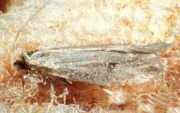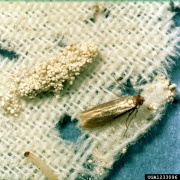Difference between revisions of "Casemaking clothes moth"
| Line 12: | Line 12: | ||
== Additional Information == | == Additional Information == | ||
| − | º MuseumPests.net: [http://cameo.mfa.org/materials/ http://www.museumpests.net/pdfholder/11image.pdf Casemaking Clothes Moth]º L. Zycherman, J.R. Schrock, ''A Guide to Museum Pest Control'', FAIC, Washington, DC, 1988. | + | º MuseumPests.net: [http://cameo.mfa.org/materials/ http://www.museumpests.net/pdfholder/11image.pdf Casemaking Clothes Moth] |
| + | |||
| + | º L. Zycherman, J.R. Schrock, ''A Guide to Museum Pest Control'', FAIC, Washington, DC, 1988. | ||
== Additional Images == | == Additional Images == | ||
Revision as of 14:18, 12 January 2014
Description
A clothes moth, Tinea pellionella Linnaeus and related species. Adult casemaking clothes moths are brown with 3 dark spots on each wing. The adult insects have a wing span of 7 to 9 millimeters. Eggs hatch in 4 to 7 days then the larva feed for 41-56 days. The larvae stage feeds on proteinaceous media, such as woolen fabrics, Hair, pelts, hides, and feathers. The 7-8 mm long larvae are white with a brown head. They encase themselves in a case spun out of the material the were feeding on. They pupate into moths in 9 to 20 days then just live long enough to mate and lay new eggs (4 to 7 days).
Synonyms and Related Terms
case-bearing clothes moth
Additional Information
º MuseumPests.net: http://www.museumpests.net/pdfholder/11image.pdf Casemaking Clothes Moth
º L. Zycherman, J.R. Schrock, A Guide to Museum Pest Control, FAIC, Washington, DC, 1988.
Additional Images
Authority
- Lynda A. Zycherman, J.Richard Schrock, A Guide to Museum Pest Control, FAIC and Association of Systematics Collections, Washington DC, 1988



